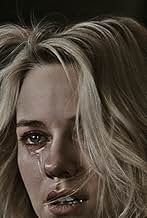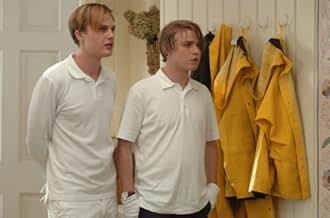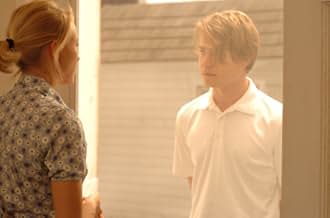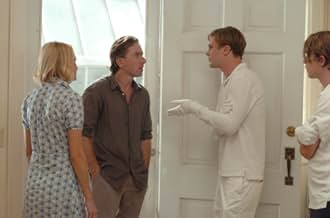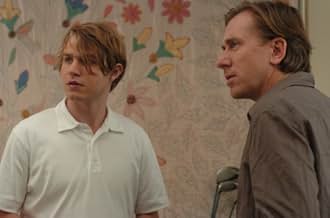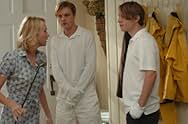- Prêmios
- 1 vitória e 6 indicações no total
Avaliações em destaque
I feel very similar about Funny Games than what I felt after watching The Strangers. Appalled and disturbed. However, Funny Games (as said by the director) seems to be a commentary on violence in media/movies, and not just violence in movies to have violence. Either way, it's certainly difficult to not feel sick to your stomach after witnessing the crimes against the family in Funny Games, but I do appreciate some of the obstacles Michael Haneke takes instead of going through with the many cliches that plague the modern day horror. But I guess we're all left asking the same question...what was the point?
6.8/10
6.8/10
I saw this at the London Film Festival and found it to be exactly what I expected: an English-language facsimile by Michael Haneke of his 1997 German film of the same title. Not that this is a bad thing. It is a testament to Haneke's artistic ability to replicate perfectly his previous film shot-by-shot with equal effect, tension, and intrigue even as one knows what to expect--although it might also say something about Haneke's ego that he doesn't feel that he needed to change or add new material for audiences who've already seen the original. The performances are overall well-executed, especially by Naomi Watts, an actress who has proved that she will still take risks despite the fact that she has made it both in the art-house scene and in mainstream Hollywood.
Haneke wanted to replicate the original film for American audiences since he has considered the story closer culturally to American society. That is a noble effort, but I am not sure if it required him to remake an exact replica of one of his earlier works, nor am I sure that it will have quite the impact he wants since the American audiences he is targeting might avoid it all together (as it might be seen as too art-house or extreme) or be completely turned off by its content and artistic approach. Nonetheless, it is interesting to witness as an exercise in a film artist revisiting his earlier work, even if he didn't bother changing anything.
Haneke wanted to replicate the original film for American audiences since he has considered the story closer culturally to American society. That is a noble effort, but I am not sure if it required him to remake an exact replica of one of his earlier works, nor am I sure that it will have quite the impact he wants since the American audiences he is targeting might avoid it all together (as it might be seen as too art-house or extreme) or be completely turned off by its content and artistic approach. Nonetheless, it is interesting to witness as an exercise in a film artist revisiting his earlier work, even if he didn't bother changing anything.
Watching "Funny Games" is a bit like coming across a major accident on the highway - you know you should continue driving on past the scene, but you just can't keep yourself from slowing down and gawking at all the wreckage.
The premise of the story does not sound very promising at first, as the idea, or a simple variation of it, has served as the foundation for countless such films in the past: an innocent family of three is held hostage in their home by a couple of sadistic killers who systematically abuse and terrorize their victims for their own twisted pleasure.
So many horror movies are predictable and formulaic that it's a pleasant surprise to come across one that actually makes an effort to break free of its bonds and make its own way in the world. And, indeed, "Funny Games" busts through the horror movie conventions with an almost ruthless determination. In this Americanized version of a film he made in his native Austria in 1997, director Michael Haneke scrupulously avoids obvious camera setups and editing techniques, bypassing virtually every storytelling, visual or audio cliché endemic to the genre. There is no background music, for instance, to cue us into the scary moments, no screeching cats jumping out of the shadows, and no point-of-view shots designed to generate easy suspense. Unlike in most films of this type, the violence here happens in an entirely haphazard and random manner, making it all the more frightening in its unpredictability and plausibility. Haneke refuses to cater to the expectations of his audience, making them face the reality of the nightmare he's showing them rather than giving them what it is they may want to see.
Michael Pitt and Brady Corbet are cringe-worthy and terminally creepy as the smarmy psychopaths who get their jollies out of watching other people suffer, while Naomi Watts, Tim Roth and Devon Gearhart engage our full sympathy as the hapless victims who have come up against the blank wall of two twisted minds they are woefully unequipped to even understand, let alone wage battle against.
This is one of the most memorable and artful horror films of recent times, but it is also one of the most unnerving and difficult to watch. The movie gets into your bones, no matter how much your better angels may be telling you to keep it out. It's depressing and disturbing and is certainly not intended for all audiences, but it is a movie that it is very difficult to shake off once you've given yourself over to it.
The premise of the story does not sound very promising at first, as the idea, or a simple variation of it, has served as the foundation for countless such films in the past: an innocent family of three is held hostage in their home by a couple of sadistic killers who systematically abuse and terrorize their victims for their own twisted pleasure.
So many horror movies are predictable and formulaic that it's a pleasant surprise to come across one that actually makes an effort to break free of its bonds and make its own way in the world. And, indeed, "Funny Games" busts through the horror movie conventions with an almost ruthless determination. In this Americanized version of a film he made in his native Austria in 1997, director Michael Haneke scrupulously avoids obvious camera setups and editing techniques, bypassing virtually every storytelling, visual or audio cliché endemic to the genre. There is no background music, for instance, to cue us into the scary moments, no screeching cats jumping out of the shadows, and no point-of-view shots designed to generate easy suspense. Unlike in most films of this type, the violence here happens in an entirely haphazard and random manner, making it all the more frightening in its unpredictability and plausibility. Haneke refuses to cater to the expectations of his audience, making them face the reality of the nightmare he's showing them rather than giving them what it is they may want to see.
Michael Pitt and Brady Corbet are cringe-worthy and terminally creepy as the smarmy psychopaths who get their jollies out of watching other people suffer, while Naomi Watts, Tim Roth and Devon Gearhart engage our full sympathy as the hapless victims who have come up against the blank wall of two twisted minds they are woefully unequipped to even understand, let alone wage battle against.
This is one of the most memorable and artful horror films of recent times, but it is also one of the most unnerving and difficult to watch. The movie gets into your bones, no matter how much your better angels may be telling you to keep it out. It's depressing and disturbing and is certainly not intended for all audiences, but it is a movie that it is very difficult to shake off once you've given yourself over to it.
I first watched Funny Games (US) and enjoyed it (well, thought it was a film I'd like to watch again), so I bought it. However, half way through a second viewing, I decided I couldn't take any more and turned it off.
Some may say that's a sure sign that it's a bad movie. They may be right - even its star Tim Roth has since refused to watch it. The film is actually an American version (filmed shot for shot) of an Austrian 'home invasion' movie and is supposed to be about 'the nature of violence.' I didn't know this when I first watched it and just looked at it as a horrific film which was deliberately quirky.
It's about a family who get held hostage in their own (holiday) home by two nasty - yet annoyingly polite - young psychopaths. The first time I watched it I stuck with it and thought it was interesting/different enough to warrant a second viewing. I guess the reason I turned it off is because it was just too frustrating to watch. I practically wanted to jump into the TV armed with a chainsaw and... well, I won't give too much away.
If you don't know about the film, I won't spoil the 'weirder' bits. It's definitely not a horror film, as there isn't much blood and gore (what there is happens off screen). It's more an experience in frustration making statements about the audience's desire to witness blood and gore on the big screen. Now, some may say that's a bit pretentious and, if you feel this way, this film probably isn't for you.
If you want to watch this - be prepared for the least 'feel good' film ever made. It's not a horror and it's not a thriller. It's simply an exercise in watching. It's different enough to rise above a lot of its fellow genre films, but may not be everyone's cup of tea and is definitely hard to sit through.
Some may say that's a sure sign that it's a bad movie. They may be right - even its star Tim Roth has since refused to watch it. The film is actually an American version (filmed shot for shot) of an Austrian 'home invasion' movie and is supposed to be about 'the nature of violence.' I didn't know this when I first watched it and just looked at it as a horrific film which was deliberately quirky.
It's about a family who get held hostage in their own (holiday) home by two nasty - yet annoyingly polite - young psychopaths. The first time I watched it I stuck with it and thought it was interesting/different enough to warrant a second viewing. I guess the reason I turned it off is because it was just too frustrating to watch. I practically wanted to jump into the TV armed with a chainsaw and... well, I won't give too much away.
If you don't know about the film, I won't spoil the 'weirder' bits. It's definitely not a horror film, as there isn't much blood and gore (what there is happens off screen). It's more an experience in frustration making statements about the audience's desire to witness blood and gore on the big screen. Now, some may say that's a bit pretentious and, if you feel this way, this film probably isn't for you.
If you want to watch this - be prepared for the least 'feel good' film ever made. It's not a horror and it's not a thriller. It's simply an exercise in watching. It's different enough to rise above a lot of its fellow genre films, but may not be everyone's cup of tea and is definitely hard to sit through.
I haven't seen Haneke's 1997 version of this film otherwise I sure would have avoided this one since, as has been said, it's a scene by scene copy. Basically, 'Funny Games U.S.' is pointless trash. I noticed many people liked it because it was different from the usual Hollywood flick. Well I'd advise them to look beyond Hollywood and they'll find plenty of movies that are different and GOOD. Why opt for something crappy just because you want something else? Others seem to find layers in the film that to me were non-existent. 'Funny Games U.S.' is pretentious garbage and the ONLY good things about it are Naomi Watts and child actor Devon Gearhart. Both deliver very natural performances and are the only people you care about on screen. Watts's name was the main thing that convinced me to watch this. Incredibly gifted actress that she is, I liked every single one of her films that I saw until now. What made her choose this film? Anyway, 'Funny Games U.S.' is a pure waste of time.
Você sabia?
- CuriosidadesTim Roth has said making this film traumatized him, and he'll never watch it. He said he was particularly disturbed because Devon Gearhart resembled his own son.
- Erros de gravaçãoWhen Ann is talking to her friend on the phone she mentions that the kitchen clock is broken and it needs fixed. The clock is clearly visible on the shelf to her right. When Peter/Tom comes back into the kitchen for eggs, the clock is missing.
- Trilhas sonorasCare Selve, Ombre Beate
from 'Atalanta'
Written by George Frideric Handel (as G. F. Händel)
Performed by Beniamino Gigli
(P) 1950 EMI Records, Ltd.
Digital Remastering: (P) 1999 EMI Records
Courtesy of EMI Music (France)
Principais escolhas
Faça login para avaliar e ver a lista de recomendações personalizadas
Detalhes
- Data de lançamento
- Países de origem
- Idioma
- Também conhecido como
- Juegos sádicos
- Locações de filme
- Empresas de produção
- Consulte mais créditos da empresa na IMDbPro
Bilheteria
- Orçamento
- US$ 15.000.000 (estimativa)
- Faturamento bruto nos EUA e Canadá
- US$ 1.294.919
- Fim de semana de estreia nos EUA e Canadá
- US$ 544.833
- 16 de mar. de 2008
- Faturamento bruto mundial
- US$ 7.948.284
- Tempo de duração
- 1 h 51 min(111 min)
- Cor
- Mixagem de som
- Proporção
- 1.85 : 1
Contribua para esta página
Sugerir uma alteração ou adicionar conteúdo ausente







